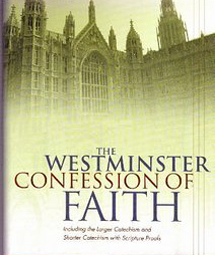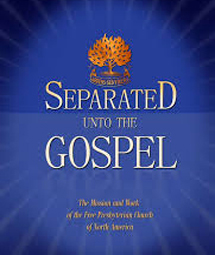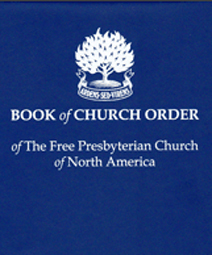The Free Presbyterian Church of North America is the fruit of the vision and ministry of the Free Presbyterian Church of Ulster (Northern Ireland). That church was formed in 1951 as a testimony to the historic faith of Presbyterians, a faith that emphasized the inspiration and authority of Scripture against the liberal, rationalist infidelity that had made serious inroads into Presbyterianism in Ireland and most other places.
From its inception, the Free Presbyterian Church has been Protestant in its convictions, Presbyterian in its government, Reformed in its theology, separatist (that is, anti-ecumenical) in its stand, and fervently evangelistic in its outreach. Its distinctive stand has been marked by its opposition to the work of the World Council of Churches (WCC), the WCC’s national arms, and its international agencies.
The WCC exists to reunite Christendom, especially Protestantism and Roman Catholicism, in a visible union. Its progress toward this goal has been marked by either a repudiation of the historic Protestant faith or such a restatement of that faith as eviscerates it in order to render more acceptable to Protestants Roman Catholic dogmas that once were anathema to them. In this way, the Roman Catholic Church’s views on the primacy of the Pope; on the Lord’s Supper as a true, expiatory sacrifice for the sins of the living and the dead; on ministers as sacrificing priests; on the equal authority of tradition with Scripture as the Word of God; and on justification as taught by the Council of Trent (rejecting justification by grace through faith alone) are seen not as dangerous heresies but as mere differences of emphasis. Against all such unscriptural ecumenism, the Free Presbyterian Church has taken a determined stand, maintaining the distinctive solas of the Reformation: sola Scriptura, the Bible as our sole authority in all matters of faith and practice; sola gratia, sola fide, solo Christo, justification by grace alone through faith alone in Christ alone; and soli Deo gloria, all to the glory of God alone.
While maintaining strict separation from false ecumenism and all who support it—and therefore opposing the inclusivist policies of those who under the guise of evangelism enter into fellowship or cooperation with Roman Catholics, liberals, and other Bible deniers—the Free Presbyterian Church has sought to stand together with all who stand for the historic Protestant faith. It has recognized that Bible-believing men whose theological positions would prevent them from becoming Free Presbyterian ministers yet exercise a ministry that is faithful to the cardinal essentials of the gospel. To the extent that cooperation and fellowship do not weaken its adherence to its own doctrinal standards or testimony, the Free Presbyterian Church has sought to strengthen the hands of those who stand for Christ and His gospel.
In its evangelism, the Free Presbyterian Church has always taken its stand for the free offer of the gospel and has never seen the doctrines of election and particular redemption as taught in Scripture and as set forth in the Westminster Confession of Faith as any barrier to this position. It has sought to keep its Calvinistic theology Christ-centered.
Throughout its history, the Free Presbyterian Church has given itself to prayer and has made its progress on its knees. The presbytery has held frequent days of prayer, has called on all the churches under its care to observe days of prayer and fasting, has inquired into the prayer life of each congregation, and has sought to encourage a fervent commitment to the place of prayer among all its people. While repudiating man-made and man-centered revivalism, the Free Presbyterian Church has sought for and received a measure of genuine revival blessing. It recognizes that true revival is a sovereign act of God, whose Spirit moves when, where, and as He wills, but it also believes that God has promised to visit His people and to attend to their cry. Thus, it earnestly gives itself to prayer for a spiritual awakening both in its congregations and much farther afield.
The Free Presbyterian Church has always had some distinctive characteristics that make its fellowship unusual. Called to raise a testimony in Northern Ireland at a time when modernism, or liberalism as it is also called, seemed to have gained a stranglehold on Irish Presbyterianism, it recognized that many who should be standing together in the battle for truth were needlessly separated because of doctrinal differences that did not affect the heart of the gospel message. One such issue was baptism, and another was eschatology; on both it adopted an innovative policy.
On baptism, the Free Presbyterian Church admitted that four centuries of debate and discussion since the Reformation had not brought us any nearer a resolution of the questions that divided baptists from paedobaptists. Therefore, to provide for a continuing discussion of their differences within the fellowship of the gospel, the Free Presbyterian Church adopted a position similar to that taken by the Calvinistic Methodists in 1874 whereby it embraced both paedobaptists and believers’-baptists in its communion. In other words, the Free Presbyterian Church did not see paedobaptism, as many Presbyterians do, as essential to the system of Covenant Theology set forth in the Westminster Confession of Faith. Repudiating the theory of baptismal regeneration, it allowed brethren to worship and serve together in mutual respect even though they differed on the mode of baptism and on the relation of believers’ children to baptism.
The same attitude has prevailed on the controversial issue of eschatology, the doctrine of last things. In the Free Presbyterian Church belief in the orthodox statements of what may be termed personal or individual eschatology (death, the state of the soul after death, a bodily resurrection, heaven, and hell) is unwavering and united. But on the issues as to whether the second coming of Christ will be pre-, post-, or a-millennial and whether, if it is premillennial, it will be pre-, mid-, or post-tribulational, there is liberty of opinion. This liberty does not extend to peculiar views of prophecy that weaken or contradict the exposition of the plan of salvation set forth in our confession and catechisms.
The Free Presbyterian Church has from its inception maintained the use of the Authorized Version of the Bible for all its public worship. It recognized the unique place of the autographs of Scripture and refused to countenance the error of the Church of Rome in elevating a translation to the authority of the original manuscripts. It also recognized that though other translations might faithfully reflect the original text, there were many that were untrustworthy. Avoiding the confusion that it saw in other churches where people frequently found it difficult to follow a preacher using another translation, it uniformly employed the Authorized Version as the standard version for its worship and service.
The Free Presbyterian Church has always been a singing church. Being Presbyterian, it has always afforded the Psalter a special place in its worship. However, it has never restricted its praise and worship to the use of psalms but has used the great hymns of the church. In its ministry of praise it has employed suitable instrumental music.
After its formation in 1951 the Free Presbyterian Church grew steadily. Today it comprises about one hundred congregations in Northern Ireland, the Republic of Ireland, England, Scotland, and Wales. In 1976 it commenced its witness in North America, first in Toronto, Canada, then in Greenville, South Carolina, and in Newtown Square, Pennsylvania. In each of these places, a congregation of believers who wished to be associated with the Free Presbyterian Church’s stand for Christ petitioned the presbytery to be taken under its care.
In 1982 the presbytery established a branch of its theological seminary in Greenville for the training of young men from the United States who felt called to the Free Presbyterian ministry. It also formed the ministers and elders of the North American churches into a standing commission, charged with the oversight and development of the work in Canada and the United States but answerable to the presbytery. The presbytery of Ulster looked on this arrangement as temporary and frequently exhorted the North American brethren to move toward the formation of an autonomous presbytery for the better government of the churches under its care.
In May 2000 the North American Commission made the decision to begin steps toward the formation of the Free Presbyterian Church of North America, and in May 2004 it formally presented a unanimous petition to the presbytery for the formation of its North American churches into a new presbytery. The following month, a delegation of ministers from the North American churches met with a special commission of presbytery in Belfast, Northern Ireland. The special commission made the following recommendations:
That a Presbytery be set up in North America as a distinct new entity and that we seek ways to foster and maintain fraternal relations between the two churches.
That those ministers who have already been sent out by the General Presbytery of the Free Presbyterian Church of Ulster to works in North America should hold dual membership in both Presbyteries.
That a consultative committee be established to consider what implications the formation of a separate presbytery would hold for missionary work and to consider possible ways of co-operation in missionary work so as not to needlessly duplicate the work of our brethren.



